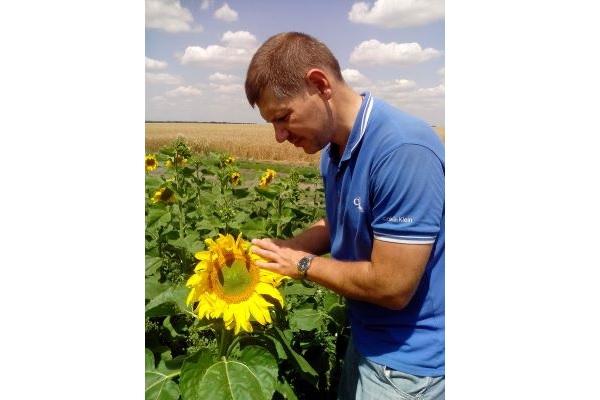Reflecting on Ukraine's Agricultural Challenges and Resilience: An Interview with Dr. Maksym Kolesnikov

The Center for Slavic, East European and Eurasian Studies (CSEEES) is pleased to welcome Dr. Maksym Kolesnikov, Head of the Department of Crop Production and Horticulture at Dmytro Motornyi Tavria State Agrotechnological University, as a BridgeUSA Ukrainian Academic Fellow. Dr. Kolesnikov, who has experienced the war in Ukraine firsthand, shared his perspectives on the impacts of the ongoing conflict on the agricultural sector, the resilience of Ukrainian farmers, and the future of Ukraine’s agricultural industry with CSEEES autumn 2024 intern Jo Baldwin.
Many Americans may not be familiar with the intricacies of Ukraine's agricultural sector, a country historically known as the "breadbasket of Europe." Kolesnikov offered us a glimpse into Ukraine’s diverse agricultural landscape, saying, “Most of the same crops grown in the USA are grown in Ukraine. Wheat, sunflower, and corn are staples, but I grew up in Melitopol, the black cherry capital of Ukraine. Melitopol black cherries are considered the best in taste and size not only in Ukraine but also in Europe. We also have a wide variety of fruits, such as peaches, apricots, and watermelons.”
Kolesnikov’s work centers on the challenges Ukrainian farmers face during wartime. “The war changed a lot in the production of crop and horticulture products,” he shared. Key issues include the reduction in sown areas by 20% compared to 2021, damage to production facilities and equipment, rising prices for fertilizers and diesel fuel, and the blockade of Black Sea ports. “Mine contamination of the land has also reduced sown areas even in the de-occupied territories, with over 400,000 hectares of agricultural land contaminated by unexploded ordnance.”
Yet, the conflict has also driven innovation. “New programs to support farmers have been launched, and the agricultural industry actively attracts foreign investors. Farmers are considering growing new crops not only due to the war but also because of global climate change,” Kolesnikov noted. He highlighted the use of new technologies, such as drones and GIS navigation systems, which enable rapid data collection and analysis.
Kolesnikov also discussed the resilience of Ukrainian farmers in the face of immense adversity. “Imagine that farmers independently make machines and de-mine their fields, sometimes putting their lives in danger,” he said. “A machine operator might harvest crops or sow seeds knowing that at any moment, he could be fired upon by bombs or artillery.”
Despite these challenges, Kolesnikov remains optimistic about the future of Ukraine’s agricultural sector. “Our future is our children. Our students are our children. And as long as the chain of transmission of knowledge isn’t interrupted, the nation has hope for the future,” he emphasized. “I believe in the Ukrainian people, I believe in the Ukrainian youth, I believe that our students will be real specialists and will be able to revive the agriculture of our country, strengthening the role of Ukraine in the global food market.”
Kolesnikov’s passion for his work and dedication to his country’s agricultural sector are evident in his personal reflections as well. When asked about his favorite traditional Ukrainian dish, he smiled and replied, “I love borsch, which is known to many as a traditional Ukrainian food. I help my wife when she cooks borsch.”
He also shared his enthusiasm for Ukraine’s cultural heritage, describing Easter and Christmas as the most warmly welcomed holidays in Ukraine. “These holidays bring people together. I love them the most,” he said. Additionally, he expressed admiration for American food, recounting how he had enjoyed different burgers and was particularly impressed by the variety of juices and sweet water available. “Better than [Jeni’s] Ice Cream, I have never tried [it] in my life!” he exclaimed.
Kolesnikov’s visit to the Farm Science Review in Ohio further highlighted the contrast between agricultural practices in the U.S. and Ukraine. “I was impressed by the high level of mechanization and automation of plant growing processes. Farmers here use high-quality seeds from well-known brands, carry out constant remote monitoring of crops, and strictly control the use of fertilizers and pesticides,” he observed.
While the war has brought about significant challenges, Kolesnikov believes in the resilience of the Ukrainian agricultural sector and the importance of adapting to changing conditions. “Our students must learn to think in a new way and have a clear understanding and plan for the restoration of agriculture in Ukraine post-war,” he said. “It is crucial to familiarize not only students but also farmers with new ecological technologies.”
If you’d like to hear more from Dr. Kolesnikov, please join us for Cultural Connections: Ukraine, Breadbasket to the World on October 7 from 11:30-12:30 in Wooster, Columbus and on Zoom. Follow the link above for more details and to register in advance.
The BridgeUSA Ukrainian Academic Fellows Program is sponsored by the U.S. Department of State's Bureau of Educational and Cultural Affairs (ECA) with additional funding provided by The Ohio State University Office of International Affairs and Center for Slavic, East European and Eurasian Studies. The program is administered by the American Councils for International Education. Thanks to the International Programs team from the College of Food, Agricultural and Environmental Sciences for their assistance in arranging Dr. Kolesnikov's visit to Ohio State.
